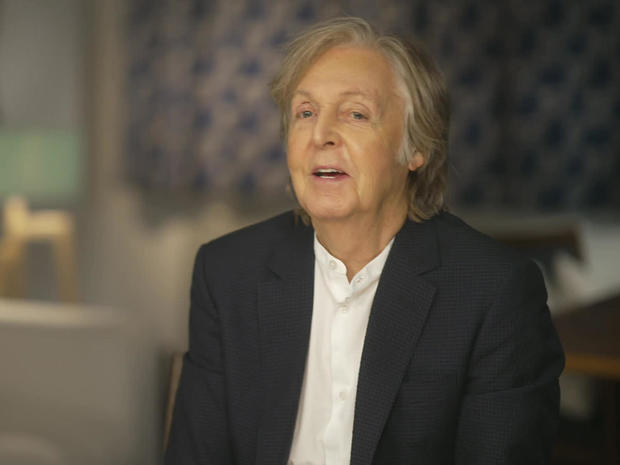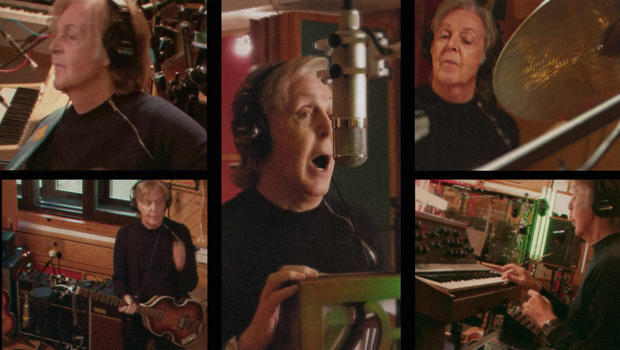Just before the interview began, Paul McCartney was joking around. "Sorry, Seth, I'm composing. Hmmm, la, la…"
But 50 years after The Beatles, he is still constantly composing, and is not letting a pandemic get in the way.
Correspondent Seth Doane asked, "Most people in lockdown have been making sourdough bread. Paul McCartney, makes an album?"
"The other thing people have been doing is cleaning out their closets, so that's a bit what that was,' McCartney said. "I just started, like, cleaning out my cupboards. Like, 'Wait a minute, what was that song last year that I started but never got to finish? Let's have a look at that. I should finish this.'"
It so happens that Sir Paul McCartney, who is 78 years old now, has more interesting cupboards than most of us, and enough fixings to create a new record: "McCartney III," released Friday. It's a sort of DIY album. It helps that McCartney has his own recording studio near his farm in England, and has had some practice. For "McCartney III," he was not only songwriter, but producer, and played every instrument.
"It's not like working with the band, because I know what I want to hear and I don't even have to tell anyone,' said McCartney. "I just said, 'Let's do some drums.' I'll sit on the drums and I'll think, 'Okay, I wanted doo doo doo.. doo doo dah…' So, it's all in my head."
The result is an album that critics have called "experimental," "freewheeling," and a "playful gem."
Doane asked, "Do you miss the feedback, in a session working with a musician?"
"No. It's just a different kind of thing. I sometimes will ask one of my engineers, 'What do you think?' Or the guys might have a suggestion.
"And I will say, 'No'!"
If making a record is different now, so is talking about it in the era of COVID. Both Doane and McCartney had COVID right before their meeting; the camera crew ran things remotely from another room. And McCartney has done almost no other in-person interviews. "I don't want to give it to anyone, I don't want to get it,' he said. "And when people sort of say, 'I don't want to wear masks, infringing on my civil liberties,' I say, 'Ah, no, that is stupid.'"
With his wife, Nancy Shevell, across the Atlantic, McCartney was living on his farm in England, recording and spending what he calls "rockdown" with his daughter, Mary, and four of his eight grandkids.
Some evenings, at dinnertime, he'd play samples for them: "So, this was just a bit of fun Granddad had in the studio."
Doane asked, "Is this the real Sir Paul McCartney? Do you feel this is the authentic you that comes across in a way that a more highly-produced album wouldn't?"
"Could be true, could be true, actually, yeah," he replied.
It follows two other solo albums. Both were initially criticized, though later earned praise. For a guy who has been inducted into the Rock and Roll Hall of Fame (twice!) and has 20 Grammy Awards, Doane found him still almost awestruck by the process: "I start on either a guitar or piano, and I'm just noodling about really. 'Ah, there's a melody here. Boom, boom, boom, boom, boom, boom, boom. Oh yeah, that's pretty good.' That's why I love it so much, because you start with nothing, and then, suddenly, after maybe a couple of hours, you got a finished song, and that's like – wow! And that still amazes me."
In what way? "It always reminds me of, like, a magician pulling a rabbit out of a hat.
"The song 'Yesterday' that I wrote, I dreamed that song, And I woke up and there was this tune in my head. Well, now, that's magic. I didn't believe it was mine for the first couple of weeks."
"What do you mean?" Doane asked.
"I thought it was, like, an old song that I've heard somewhere, maybe from my Dad's generation."
"Just in your head?"
"Someone's going to go, 'Oh, no, that's from "West Side Story"!' I'd go Argh! But no one ever found what it was. And, in the end, they said, it's yours!"
During the Sixties, with Beatles writing partner John Lennon, they turned out around 300 songs.
McCartney said, "We never had a dry session. We'd come in, we'd sit down, about three or four hours later we had a song. Looking back on it, wow, how lucky was that? Or could it be skill?" he laughed.
"It was always fun. We got so used to it, after the first 50 songs we'd written together, we kind of knew how it was going to go. So, if it was a song I'd brought in, I would just do the first couple of lines, and he would just follow it on. I started 'It's getting better all the time …' and he went, 'It couldn't get much worse.'"
Along with Ringo Star and George Harrison, The Beatles skyrocketed to fame from humble, working-class roots in Liverpool, England.
Doane asked, "Can you believe that what you did so many years ago still translates, still resonates, is still a gold-standard today?"
"It is pretty crazy," McCartney replied. "I remember when I was a kid and when The Beatles was just first starting, I remember my cousin saying to me, 'Do you think any of your songs are ever going to be standards?' And I remember saying, 'Yeah,' thinking …"
"You think you knew?"
"I didn't know. I guessed. But I just had a feeling that some of the stuff that we were writing was pretty memorable."
"What is it about the music that is so, that touches people so deeply?"
"I'm not sure I have an answer," McCartney said. "Something to do with the structure of the song. There's no spare stuff that shouldn't be in there. It's the exact amount of stuff that should be on that record. But I am amazed at how it keeps going. I'm amazed, maybe I'm amazed."
"I've heard that somewhere …"
"Oh, yeah, good idea for a song!"
"Maybe I'm Amazed" was on his 1970 solo album "McCartney," the first of this now-trilogy, which marked his separation from The Beatles. They'd split up in 1969, citing artistic and business differences. John Lennon also went on to have his own solo career, until he was shot and killed in front of his home exactly four decades ago this month.
Doane asked, "I wonder how, all these years – 40 years later – you're processing it?"
"I'm not sure I am," said McCartney. "It's very difficult for me, and I occasionally will have thoughts and sort of say, 'I don't know, why don't I just break down crying every day?' Because it's that bad."
"Do you sometimes?"
"Not every day, you know? There will be times that I just have memories and just think, 'Oh my God, it was just so senseless.'"
"Do you think he'd still be writing, producing like you are?"
"Yeah. He was showing no signs of slowing up. You know, he was still making great music. The question is, would we have ever got back together again?"
What's the answer? "I don't know!" McCartney said. "We don't know. We were friends. That was one of the great things about it. You know, I don't know how I would've dealt with it. 'Cause I don't think I've dealt with it very well. You know, in a way, you know … I wouldn't be surprised if a psychiatrist would sort of find out that I was slightly in denial. Because it's too much."
McCartney told us he still has dreams about John Lennon, and thinks about him when he writes.
"What happens if you're in the car and a Beatles song comes on?" Doane asked. "What do you do? You turn it up? Turn it off?"
"Turn it up! Turn it up! Sing along with it. It always takes me back to the session, you know, it always reminds me, 'Oh yeah, I remember John was there, Ringo was there, where we did this one. Yeah, yeah …' It's great, it takes you right back like a flashback."
Today when he gets new ideas for melodies, he records them on his phone as a voice memo.
Doane asked, "I wonder how many hits are still sitting in your iPhone?"
"I don't know, I don't know,' McCartney said. "On one of the songs off the new album, called 'Kiss of Venus,' I wrote it one summer's day, and I got the beginning of it – The Kiss of Venus, da, da, da, da – and I thought, 'Oh, that's OK, I'll record it, I'll finish it someday.' But then I said to myself, 'No, what have you got? You haven't got anything on [right now]. Sit here and finish that bloody song!'"
It turns out, in lockdown, Paul McCartney produced not just a record, but a reminder for the rest of us which, no surprise, he put to music: "Seize the Day."
When the cold days come,
and the old ways fade away
There'll be no more sun,
and we'll wish that we had held on to the day
Seize the day
For more info:
Story produced by Mikaela Bufano and Alan Golds. Editor: Steven Tyler.
See also:
https://ift.tt/2WyIVko
Entertainment
Bagikan Berita Ini
















0 Response to "Paul McCartney on creating "McCartney III" in lockdown, and remembering John Lennon - CBS News"
Post a Comment